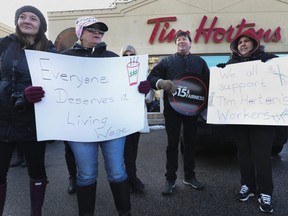EISEN: Time to rethink minimum wage as an anti-poverty tool in Ontario

Article content
Former Prime Minister Kim Campbell once famously quipped that “an election is no time to discuss serious issues.”
Unfortunately, this is often true, as exemplified by the lack of meaningful debate on minimum wage policy during Ontario’s recent election.
The previous Liberal government pursued substantial increases to the minimum wage. It’s not yet clear whether Doug Ford’s PC government intends further increases or will just maintain last January’s increase from $11.60 to $14.00.
In any case, despite widely held misperceptions and claims from advocacy groups that will no doubt keep pushing for a higher minimum wage, the fact remains that it’s an ineffective way of fighting poverty because it fails to target those who need help the most.
To understand why, consider a basic fact: the vast majority of minimum wage earners in Ontario are not poor. In fact, according to the latest available data before the recent wage hike took place, 90.8% were not part of a low-income family, as defined by Statistics Canada’s low income cut-off.
This sounds counterintuitive, but makes sense once you realize that minimum wage earners tend not to be the their family’s primary wage earner. Instead, they are mostly inexperienced teenagers or young adults living with parents.
In 2017, nearly 60% of Ontario minimum wage earners were between the ages of 15 and 24, and virtually all lived at home.
It’s a similar story for many older minimum wage earners in Ontario who have an employed spouse that typically earn more.
Thankfully, the example of a single parent struggling to support a family on minimum wage is quite rare. In reality, only 2.1% of minimum wage earners in 2017 were single parents of young children.
There’s another problem — a higher minimum wage makes it harder for inexperienced workers to find work. Just as consumers purchase less of something if its price rises (with no corresponding increase in quality), employers often respond to minimum wage hikes by spending less on labour.
Canadian academic research agrees that minimum wage increases predominantly reduce employment opportunities for young people — a 10% minimum wage increase results in a 3-to-6% reduction in youth employment.
These are serious shortcomings of using minimum wage hikes as an anti-poverty tool. Luckily, there’s a better policy option available to help the working poor that provides targeted benefits without negative economic consequences. A work-based subsidy, in the vein of the Canada Workers Benefit — a federal program — is worthy of consideration.
Under such a program, the government tops up wages household incomes below a determined threshold via cash subsidies. This more efficiently increases the take-home pay of the working poor without making it harder for employers to hire less-skilled workers.
Perhaps now that the election is over a more serious debate about the best way to help Ontario’s working poor can take place.
Ben Eisen is the Fraser Institute’s director of provincial prosperity studies. This column was co-authored by the Institute’s Charles Lammam and Hugh MacIntyre. For more details see their study, “Increasing the Minimum Wage in Ontario: A Flawed Anti-Poverty Policy,” at www.fraserinstitute.org











Postmedia is committed to maintaining a lively but civil forum for discussion. Please keep comments relevant and respectful. Comments may take up to an hour to appear on the site. You will receive an email if there is a reply to your comment, an update to a thread you follow or if a user you follow comments. Visit our Community Guidelines for more information.